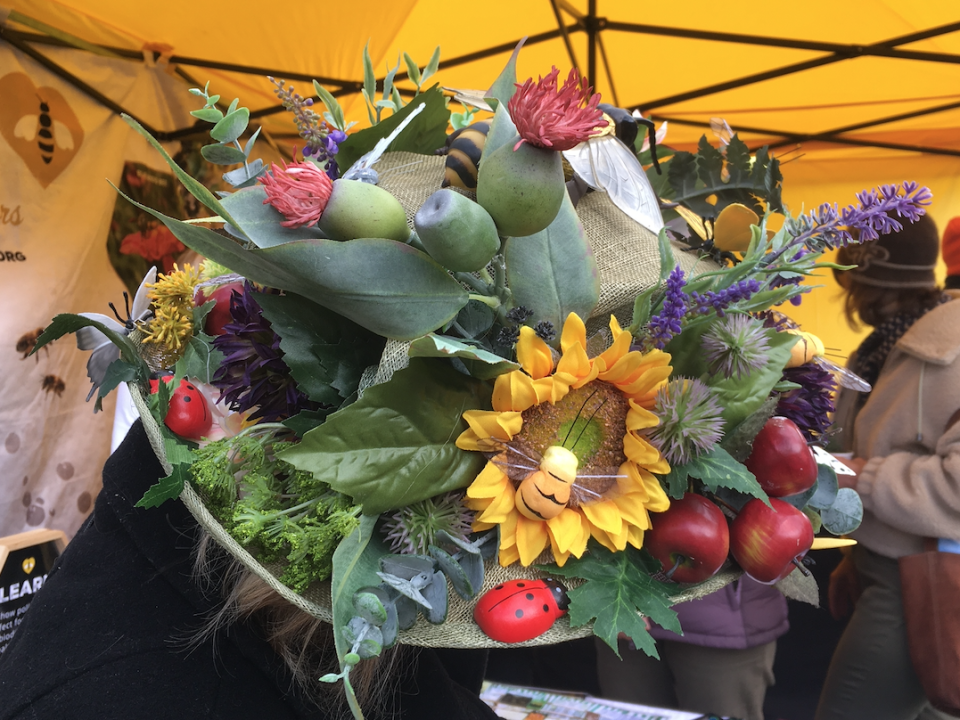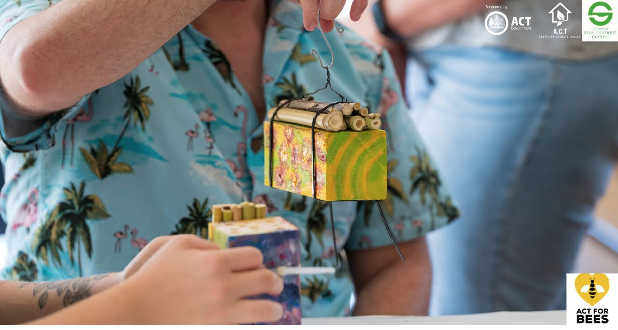Australian National Botanic Gardens Native Bee cheat sheet
February 15, 2021ACT for Bees Autumn 2021 Buzzz- A focus on Trees
April 29, 2021Dear ACT for Bees community
Well, 2020 was certainly a challenging year on many fronts. We hope that you are all well and safe at the start of 2021. In the ACT region, we’ve been blessed with plentiful rain and the countryside is gorgeously green at the end of summer! Our gardens have not been so floriferous for years – a veritable feast for our pollinators and a joy to see so many honey bees, native bees, butterflies, moths and flies flitting about.
There’s lots more to be excited about in 2021 for ACT for Bees!
Native Bee Education and New Curriculum Units
To start the school year, we have a new native bee unit in ‘Love Food? Love Bees! Yr 5/6’ curriculum. In this unit, students develop an understanding of the importance of native bees and propose actions to protect them. We also have a new Learning@Home unit where children are given the opportunity to find out more about Australian native bees.
These resources are available to everyone irrespective of where they live in Australia or overseas.
 Peter Abbott has been leading Native Bee spotting walks at the Australian National Botanic Gardens (ANBG) for a number of years. He’s just created a ANBG Native Bee cheat sheet which we’ve found extremely useful! Thanks Peter for sharing it with us.
Peter Abbott has been leading Native Bee spotting walks at the Australian National Botanic Gardens (ANBG) for a number of years. He’s just created a ANBG Native Bee cheat sheet which we’ve found extremely useful! Thanks Peter for sharing it with us.
Applications for Woolworths Junior Land Care Grants are now open. These grants are for projects that focus on sustainable food production, improving waste management practices or enhancing native habitats. There are two age categories – 0-7and 7-13 years with individual grants of up to $1000. Applications close 19 March. Be quick!
Ginninderry Project
 ACT for Bees has been collaborating with Ginninderry development for ‘pollinator corridors’ with planting for year round flowering for pollinators. We are very excited that the 2nd stage, Macnamara has extensive plantings for native bees based on the ACT Government’s ‘Plant Species for Urban Landscape Projects’, the revised list of street trees, shrubs and ground covers which now includes flowering times, nectar, pollen, seed resources and species for foragers (bees, butterflies, birds and habitat for small mammals) and a recent addition of Ngunnawal cultural notes.
ACT for Bees has been collaborating with Ginninderry development for ‘pollinator corridors’ with planting for year round flowering for pollinators. We are very excited that the 2nd stage, Macnamara has extensive plantings for native bees based on the ACT Government’s ‘Plant Species for Urban Landscape Projects’, the revised list of street trees, shrubs and ground covers which now includes flowering times, nectar, pollen, seed resources and species for foragers (bees, butterflies, birds and habitat for small mammals) and a recent addition of Ngunnawal cultural notes.
Planning is well underway for our workshop with Ginninderry on ‘Planting for Pollinators: Maximising Biodiversity in Urban Design’ to inspire other landscape architects and developers to include planting for pollinators in new developments. The workshop will be held on 16 April and is principally directed towards land developers, builders and landscapers. It will include speakers from industry and government and is being supported by the Australian Institute of Landscape Architects.
Ginninderry stretches from the north western suburbs of Canberra (Holt and Macgregor) across the ACT/NSW border into a part of the Yass Valley. It is bounded on two sides by the Murrumbidgee River and Ginninderra Creek which are important regions for biodiversity. The West Belconnen/ Parkwood land constitutes a total area of around 1600 hectares. However, only around half of this or 800 hectares will be developed. The remaining 800 hectares will be an open space network created by a 577 hectare conservation corridor along the Murrumbidgee River and Ginninderra Creek. The size of the conservation corridor and the planting for pollinators is what makes this project particularly exciting.

Citizen Science Project- Spring results for the Wild Pollinator Count
Over 1000 observations representing over 12,000 insects were made to the Spring 2020 Wild Pollinator Count 8-15 November 2020 and results were released just before Christmas.
For understandable reasons, it took the organisers of this wonderful citizen science project a bit longer than usual to collate results!
The ubiquitous European honey bee was the most observed visitor, with native flies and bees coming in equal second. More exotic plants (57%) were watched for insect visitors than native plants (43%). This is understandable, as flowering seasons of native plants may have been erratic because of drought and bushfires.
| Total insects counted in all our categories | 12,011 |
The next Wild Pollinator Count will happen 11-18 April 2021.
Food in the Capital – November 2020
Last November, Canberra played host to Food in the Capital, a first of its kind, sustainable food conference program. The event set out to connect farmers, food businesses and manufacturers, community groups, thought leaders and policy makers. ACT for Bees was there!
In addition to insights from experts on market trends, the events promote food as a basis for economic diversification in the ACT region. It highlighted the potential for locally sourced food to be the vehicle for reducing emissions, utilising food waste, building social inclusion and improved food security and nutrition.
Food security needs bee/ pollinator security! Two further events are planned for May and November 2021. Go to their website to book your ticket!
 Save the date!! World Bee Day 20 May 2021
Save the date!! World Bee Day 20 May 2021
The programme of events for World Bee Day is currently being finalised and we’ll give you further details later. Most events in Canberra will be held on Saturday 22 May which just happens to be World Biodiversity Day! More details on ACT for Bees events website soon and updates on ACT for Bees Facebook page.



